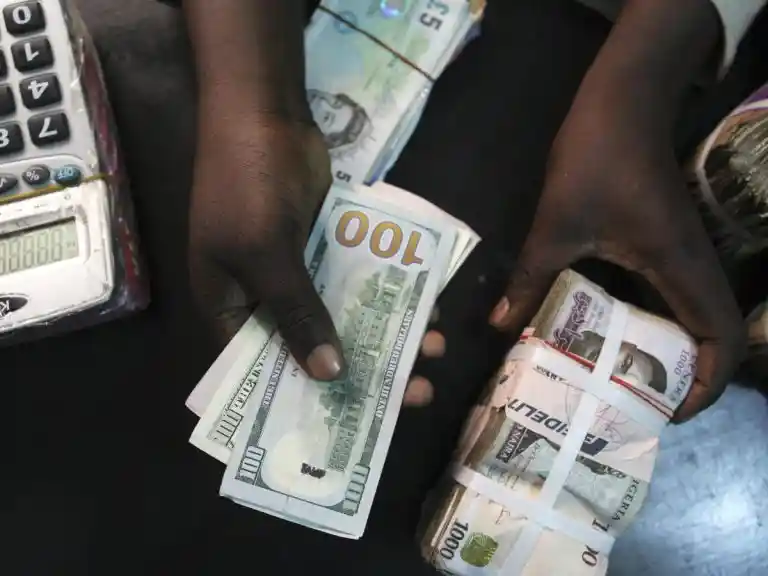The Nigerian naira opened the new week on a weaker footing against the US dollar across various trading segments, including the official market, black market (parallel market), and Bureau De Change (BDC) channels. On Monday, August 4, 2025, the dollar to naira exchange rate today shows slight depreciation in value as investor sentiments remain cautious amid ongoing policy adjustments by the Central Bank of Nigeria (CBN).
At the parallel market, also known as the black market, the naira traded at an average of ₦1,570 per US dollar in Lagos and other major urban centers. This reflects a minor slide from Friday’s average of ₦1,560, driven largely by increased demand pressure and uncertainty surrounding Nigeria’s foreign exchange regime.
TJ News Nigeria reports that while official channels recorded relative stability, the divergence between the Investors & Exporters (I&E) window and the black market continues to fuel speculation and hoarding among market participants.
Summary of Dollar to Naira Exchange Rate Today – August 4, 2025
| Market Segment | Exchange Rate (₦/USD) | Trend (Day-on-Day) |
|---|---|---|
| CBN Official Rate | ₦1,495.85 | -0.10% (Stable) |
| I&E Window | ₦1,512.40 | +0.25% (Slight Rise) |
| Black Market Rate | ₦1,570 | -0.64% (Weaker) |
| BDC Operators (Avg.) | ₦1,565 – ₦1,575 | Mixed |
Why the Naira Is Losing Ground Again
The continued pressure on the naira in the parallel market is largely tied to several factors:
1. Foreign Exchange Liquidity Constraints
Nigeria is still grappling with insufficient dollar supply. Despite the floating of the naira and the central bank’s efforts to unify rates, liquidity at the I&E window has not met the demand by businesses, importers, and foreign investors.
2. Investor Confidence Issues
Many foreign portfolio investors are still cautious about re-entering Nigeria’s financial markets. While some reforms have been welcomed — including the gradual clearing of FX backlogs — delays in full implementation continue to spook market watchers.
3. Rising Demand for Dollars
As schools abroad resume for the new academic calendar, there’s renewed pressure on FX from parents and students seeking forex for tuition and living expenses. Similarly, importers are securing funds ahead of year-end sales planning.
4. Speculation and Arbitrage
With inconsistent rates between the official and parallel markets, speculators continue to take advantage of the gap to drive profits, thereby distorting normal market dynamics.
Official CBN Rate vs Parallel Market: The Gap Widens
The official rate published by the Central Bank of Nigeria remains significantly lower than the open market rate. As of Monday, the CBN rate was pegged at ₦1,495.85 per dollar. However, most Nigerians and businesses can’t access dollars at this rate due to limited supply, pushing them to the black market.
According to traders in Lagos’ Ikeja and Abuja’s Wuse BDC zones, most BDC operators offered to sell dollars at ₦1,570 or more, while buying between ₦1,540 and ₦1,550 depending on volume.
Traders Speak: “Dollar Scarcity Still an Issue”
A currency dealer, Kabiru Aliyu, told TJ News Nigeria in Abuja:
“There’s no real supply from banks. The official window is tight. Even BDCs that used to get dollar allocations regularly are struggling. We’re all relying on private inflows now. That’s why the black market rate keeps going up.”
Another BDC operator in Lagos, Ifeoma Okeke, noted:
“People are buying a lot now — school fees, travel, import goods. Even those who have naira are finding it hard to get dollars fast. That’s why it’s ₦1,570 today, and maybe more by next week.”
Government’s Position on Naira Depreciation
The Federal Government maintains that recent naira movements reflect market forces following the unification of exchange rates in 2023. Minister of Finance, Wale Edun, reiterated in a recent media briefing that reforms are ongoing to restore stability and confidence.
He said:
“We expected volatility in the short term. What matters is that we’ve created a framework that allows the naira to find its true value. Over time, stability will return as inflows increase.”
The Central Bank of Nigeria under Governor Olayemi Cardoso also insists that transparency and structural reforms will eventually strengthen the naira.
Is the Naira Likely to Fall Further?
Market analysts suggest that unless dollar inflows significantly improve — either through higher crude oil earnings, foreign direct investment, or diaspora remittances — the naira may continue to hover around ₦1,550 to ₦1,600 in the short term.
Also Pay Attention To Uromi Building Collapse: Hotel Owner Killed, Over 20 Workers Injured in Edo State Disaster
Some analysts also warn that:
- Excessive dependence on the black market skews real currency valuation.
- Inflation remains high at over 28%, further eroding purchasing power.
- The debt servicing-to-revenue ratio may affect investor appetite for naira-denominated assets.
What This Means for Nigerians
The implications of the weakening naira are far-reaching:
For Businesses:
- Higher import costs
- Difficulty pricing goods and services
- Increasing operational expenses
For Individuals:
- Rising cost of living
- Higher tuition and medical fees abroad
- Reduced purchasing power
For Government:
- Budgetary challenges, especially if crude oil benchmark expectations are not met
- Difficulty in attracting foreign investors if currency risk remains high
Historical Overview of Dollar to Naira Exchange Rate
Here’s how the dollar to naira exchange rate has moved over the last few months:
| Date | Official Rate | Black Market Rate |
|---|---|---|
| June 3, 2025 | ₦1,478 | ₦1,510 |
| June 24, 2025 | ₦1,485 | ₦1,540 |
| July 5, 2025 | ₦1,492 | ₦1,550 |
| July 20, 2025 | ₦1,494 | ₦1,560 |
| August 2, 2025 | ₦1,495 | ₦1,560 |
| August 4, 2025 | ₦1,495.85 | ₦1,570 |
What Can Be Done?
Experts recommend the following to improve Nigeria’s FX outlook:
- Increase non-oil exports to generate more FX earnings.
- Streamline FX access for SMEs and critical sectors.
- Harmonize tax and trade policies to attract foreign capital.
- Support local production to reduce import reliance.
- Digitalize remittance systems to encourage inflows through official channels.
Market Awaits Policy Clarity
The dollar to naira exchange rate today reflects a complex interplay of global economic pressures and local structural challenges. As the Central Bank fine-tunes its policies and the government works to deepen reforms, all eyes remain on how the FX market evolves over the coming weeks.
Until then, Nigerians are urged to transact through verified channels and stay informed via trusted sources like TJ News Nigeria, CBN official portal, and reliable market analysts.






